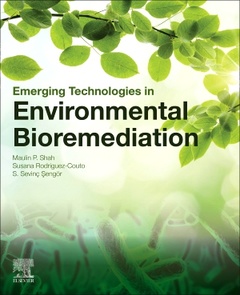Emerging Technologies in Environmental Bioremediation
Coordonnateurs : Shah Maulin P., Rodriguez-Couto Susana, Sengor S. Sevinc

Emerging Technologies in Environmental Bioremediation introduces emerging bioremediation technologies for the treatment and management of industrial wastes and other environmental pollutants for the sake of environmental sustainability. Emerging bioremediation approaches such as nano-bioremediation technology, electro-bioremediation technology, microbial fuel cell technology, Modified Ludzack-Ettinger Process, Modified Activated Sludge Process, and phytotechnologies for the remediation of industrial wastes/pollutants are discussed in a comprehensive manner not found in other books. Furthermore, the book includes updated information as well as future directions for research in the field of bioremediation of industrial wastes.
This book will be extremely useful to students, researchers, scientists and professionals in the field of microbiology and biotechnology, Bio (chemical) engineers, environmental researchers, eco-toxicology, and many more.
Engineers, scientists who require an excellent introduction and basic knowledge to the principles of Environmental Bioremediation Technologies.
Different professionals, mangers working or interested in the Environmental Microbiology or Bioremediation fields
Students of Environmental Biotechnology/Microbiology
Dr. Maulin P. Shah is Chief Scientist and Head of the Industrial Waste Water Research Lab, Division of Applied and Environmental Microbiology Lab at Enviro Technology Ltd., Ankleshwar, Gujarat, India. His work focuses on the impact of industrial pollution on the microbial diversity of wastewater following cultivation-dependent and cultivation-independent analysis. His major work involves isolation, screening, identification, and genetically engineering high-impact microbes for the degradation of hazardous materials. His research interests include biological wastewater treatment, environmental microbiology, biodegradation, bioremediation, and phytoremediation of environmental pollutants from industrial wastewaters.
Susana Rodríguez-Couto (female) got her B.Sc. and M.Sc. in Chemistry (Industrial Chemistry) from the University of Santiago de Compostela in 1992 and her Ph.D. in Chemistry in 1999 from the University of Vigo, obtaining the maximal grade (magna cum laude) and, in addition, she was awarded with the Extraordinary Prize for Doctoral Thesis in Chemistry. She worked as an Associate Professor and an Isidro Parga Pondal Senior Researcher at the University of Vigo (2000-2004), as a Ramón y Cajal Senior Researcher at Rovira i Virgili University (2004-2008) and as an Ikerbasque Research Professor (2009-2019). She has also worked as an Invited Researcher at the Institute from Environmental Biotechnology, Graz University of Technology (Austria) and at the Department of Biological Engineering, University of Minho (Portugal). In 2008, she received the I3 Professor from the Spanish Ministry of Science and Education to the recognition of an outstanding research activity. In March 2021 she is joining LUT School of Engineering Science at Mikkeli, Finland, as a Full Professor in biological water treatment. She has published more than 140 articles in highly reputed international journals (h index 42). She is editor of several journals (3Biotech, Frontiers)
- Includes the recovery of resources from wastewater
- Describes the importance of microorganisms in environmental bioremediation technologies
- Points out the reuse of treated wastewater through emerging technologies
- Pays attention to the occurrence of novel micro-pollutants
- Emphasizes the role of nanotechnology in pollutant bioremediation
Date de parution : 04-2020
Ouvrage de 498 p.
19x23.3 cm



